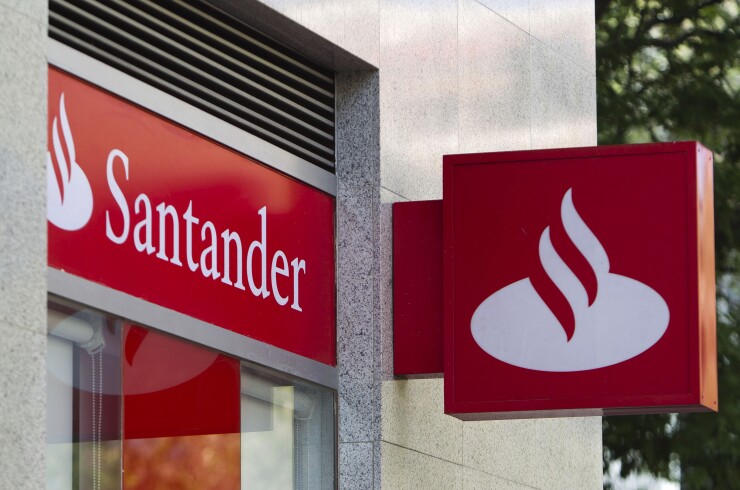
A Norwegian mobile wallet this week enabled its local users to make payments on iPhones by directly accessing Apple's technology, making it an early mover in the race to take advantage of Apple's acquiescence to European antitrust regulators.
The Oslo-based Vipps MobilePay said this move followed years of "fighting" to be on equal footing with Apple, and it "feels surreal" to be able to offer its own iPhone payments service.
The EU in July accepted
Consumers of BNB, SparBank 1 and more than three dozen other local banks covering about 70% of the local market can use Vipps on iPhones and other Apple devices. Vipps will initially focus on the Nordic region, according to an email from its public relations officer, noting it is exploring other markets.
"We anticipate significant shifts in the mobile wallet landscape, particularly with the recent EU agreement paving the way for more competition. It's likely that numerous players in Europe will introduce tap-to-pay solutions," said Kari Kjaer, a spokesperson for Vipps.
Apple faces regulatory and legal pressure in dozens of countries to lower the walls of its garden, including restrictions and fees that it charges third parties to use the Apple App Store, and barriers to using the near field communication technology that supports contactless payments.
"It's a big milestone to see a fully functional digital wallet capable of contactless point-of-sale transactions available on iOS that is not Apple Pay," said Zil Bareisis, a director at Celent. "That was indeed the intent of the EU agreement."
Payment experts have said that while Apple faces more competition, the technology giant's
"I expect that many other existing wallets around Europe will follow suit and add the contactless ability to provide an alternative to Apple Pay," Bareisis said.
Samsung and Curve, a fintech that sells an "all in one card" that enables consumers to switch payment cards after the point of sale, are co-developing a mobile wallet to be a rival to Apple Pay as regulation pushes concessions from the technology giant.
"The stage is set for a more diverse cast of digital payment providers, and with Curve Pay going through some final testing before launch, we look forward in the very near future to introducing consumers to a whole new way of managing their money," Shachar Bialick, CEO and founder of Curve, said in an email. Curve's payment app is undergoing final testing and will soon be introduced in the U.K.
"Some banks may believe it's worthwhile to make an investment to enhance their existing mobile banking apps; however, that option has been available to them in the Android ecosystem via

Klarna fined $45.6M for AML shortcomings
Buy now/pay later firm Klarna has been hit with a 500 million Swedish krona ($45.6 million) fine from the country's Financial Supervisory Authority for anti-money-laundering violations.
The FSA found that Klarna did not evaluate how the bank's products and services could be used for money laundering or terrorist financing. It also found that Klarna lacked procedures and guidelines for when due diligence measures should be taken on customers that use the company's invoice product.
The FSA conducted the general risk assessment and customer due diligence investigation from April 2021 to March 2022, the regulator said. Swedish news outlet Dagens Industri reported that the regulator
""The decision from the SFSA follows a routine review, initiated in 2022, of Klarna's compliance with anti-money laundering regulations—not actual cases of money laundering," a Klarna spokesperson said in an email. "We have maintained constructive dialogue throughout this process which is part of our commitment to a robust and secure financial environment."
The rebuke comes as Klarna prepares for an initial public offering in the United States that will stack the company against its competitors and
TD Bank in October took a record

Ex-PayPal exec to lead Banco Santander's digital bank
Nitin Prabhu, PayPal's former head of product, SMB and financial services, will join the Spanish bank as global head of Digital Consumer Bank, one of Santander's five global businesses that includes
Prabhu will join the bank in "early 2025" and be based in Madrid, reporting to the group executive chair. The appointment is subject to regulatory approval.
"Nitin brings a strong customer focus and understanding of how to build digital products that meet client needs, and I am confident he will help the business continue to generate profitable growth," Banco Santander Executive Chair Ana Botín said in a statement.
Digital Consumer Bank operates in 26 countries in Europe and the Americas and has 25 million customers, according to Santander. It generated about 9.6 billion euros ($10.1 billion) in revenues through the first nine months of 2024. —Joey Pizzolato

Swift partners with Google Cloud for cross-border fraud protections
Global messaging network Swift and Google Cloud are working to use artificial intelligence and federated learning to develop anti-fraud technologies to combat cross-border payment fraud.
Swift and Google Cloud are planning to launch in early 2025 a sandbox with 12 global financial institutions that will use synthetic data to prototype learning from historic fraud data.
All data will be anonymized. Rhino Health will develop and deliver the core federated learning platform, and Capgemini will manage the implementation and integration of the solution.
"Our collaboration with Swift exemplifies the transformative potential of federated learning and confidential computing. By enabling secure collaboration and knowledge sharing without compromising data privacy, we are fostering a safer and more resilient financial ecosystem for everyone," said Andrea Gallego, managing director of global GTM incubation at Google Cloud, in a statement.
The partnership builds on a

Big bank B2B apps pick up steam
Called CashPro,
CashPro has more than 555,000 users in 40,000 companies worldwide.
Following the COVID-19 pandemic, recent inflation and corresponding economic challenges, banks face pressure to upgrade their B2B payment systems to reach businesses that are trying to better manage their balance sheets, according to
The overall B2B cross-border payments market is estimated to reach $68 trillion in 2024 and is growing at a pace to reach $121 trillion by 2033, according to Custom Market Insight. —John Adams

Cash holds strong in the U.K.
The growth of digital payments in the U.K. frequently sparks controversy as banks attempt to manage the increasing
But there are signs that the cash decline has slowed or may be reversing. Twenty percent of in-store payments in the U.K. in 2023 were in cash, up from 19% in 2022, according to the British Retail Consortium.
The BRC's study found that debit cards are the most common payment method at 62% with credit cards accounting for about 19%.
The cost of living and inflation contributed to cash's resilience, as consumers made more trips to stores but made smaller, more frequent purchases. Cash has become a favored way for people to manage their budgets, according to the BRC.
This data could provide support for attempts to force banks to protect access to cash. The

Revolut seeks regulatory cover to battle banks in New Zealand
London fintech Revolut has applied for a banking license in New Zealand, which would enable the company to offer interest-bearing savings and expand credit products.
Revolut launched in New Zealand in 2023 and has processed about US$203 million in payments. The fintech has banking licenses in several countries beyond the U.K. as it seeks to build a financial super app, or a single source for a number of banking products. Revolut hopes to take on ANZ, ASB, BNZ and Westpac, among other fintechs and banks in New Zealand.
Revolut recently received a
In the U.S.,

Santander to use CloudPay for EWA in Spain
Banco Santander has partnered with payroll solution provider CloudPay to bring its pay-on-demand product to the bank's small and medium-size enterprise customers.
The move opens the door for smaller companies to access
"Our partnership with Banco Santander represents a major step forward in transforming the pay experience and providing employees with flexible, real-time access to their wages," said Timo Weber, CloudPay's chief strategy officer, in a statement.
Liquid access to payroll has become a key value-add for businesses looking to attract talent.
According to a CloudPay survey, 44% of employees said that access to EWA would increase their loyalty to their company. —Joey Pizzolato





